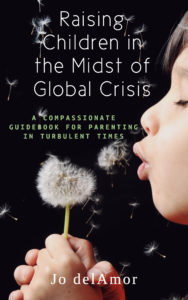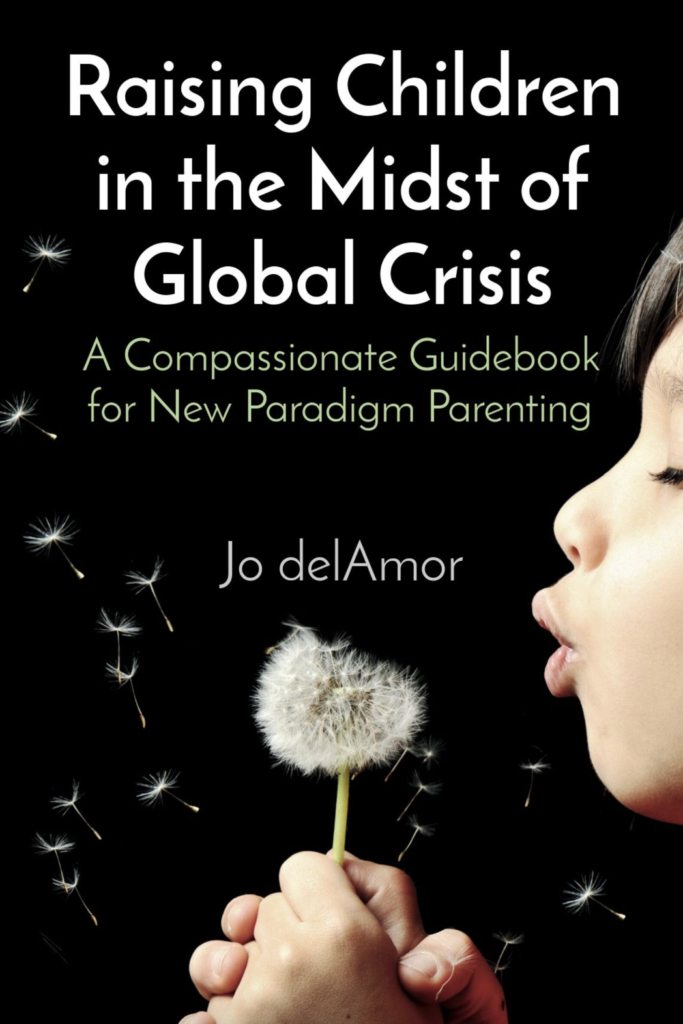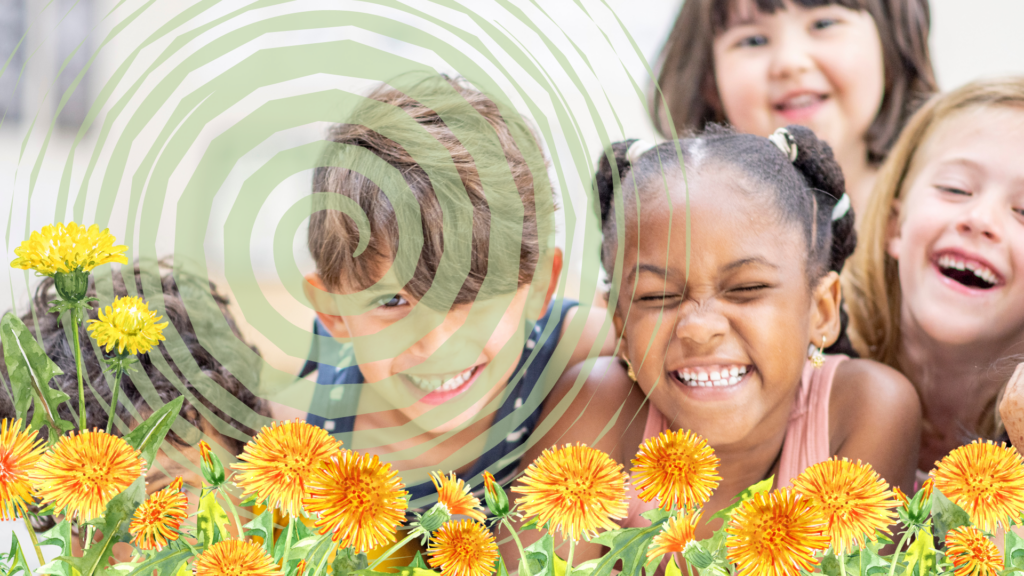This blog post is an excerpt from the forthcoming book “Raising Children in the Midst of Global Crisis: A Compassionate Guidebook for Parenting in Turbulent Times” by Jo delAmor
Beyond loving connection, my parenting and teaching style boils down to paying attention with presence and deeply respecting the kids in my care. If we’re paying attention with respect and compassion, our kids will give us all the information we need about how to take care of them properly. The feedback they give us through the states of their physical, emotional and mental wellness is way more valuable than anything we could read in a book or blog. As we get to know them and bring our attentive presence to our relationship with them, we’ll know exactly what to do for them.
“Speak to your children as if they are the wisest, kindest, most beautiful and magical humans on earth, for what they believe is what they will become.”
— Brooke Hampton

Your children are amazing!
Truly. They arrived on this planet with a complete soul, a rich personality and a mission that is deeply worthy of your respect. You have a lot to learn together and they have a lot of development to do along the way, but they are not incomplete or inferior to you in any way.
They have equal worth and, if you pay close enough attention, you may see that their intelligence and capacity wildly outshine yours. They are carrying messages and memories from the other world that we adults have long since forgotten. They are growing, changing, learning and figuring things out at a rate that you will never again achieve in your adult life. They are accomplishing outrageous successes on a daily basis. They are more than worthy of your respect.
In the Thriving Life Paradigm respect is a two-way street. It is mutual, reciprocal, regenerative and unconditional.
Sadly, when I looked up the definition of the word respect, I found some very old paradigm examples. These definitions give some insight into the hurdles we’re facing as we seek to break the cycle of authoritarian parenting with its “because I said so” mentality.
From the Lexico online dictionary (“powered by Oxford”) I found these two definitions:
- a feeling of deep admiration for someone or something elicited by their abilities, qualities, or achievements.
“the director had a lot of respect for Douglas as an actor” - due regard for the feelings, wishes, rights, or traditions of others.
“young people’s lack of respect for their parents”
In the first definition we’re led to believe that respect has to be earned and that it is conditional upon your achievements and abilities. This puts into perspective the general lack of respect typically shown to children since they haven’t had the time or opportunity to develop or prove their abilities and accomplishments. The second definition uses an example that shines a spotlight on our general understanding of respect as a one-way thing that flows from subordinates to superiors, revealing the unconscious hierarchical bias built into us by the Power Over Paradigm.
When I found the word respect in the Merriam-Webster online dictionary it had much more of the quality we are looking to cultivate in our relationships with our children.
- to consider worthy of high regard
- to refrain from interfering with
Holding our children in high regard and refraining from interfering with their sovereign paths is a great summation of the type of respect we can practice in our parenting.
Children need us to hold them in high regard unconditionally even (and perhaps especially) when they are struggling or not behaving the way we want them to. When we hold our children in high regard, we’re more able to work with them to move through challenges instead of getting frustrated with them and disparaging them in some way if they don’t meet our expectations.
Practicing respect for our children involves following their lead energetically and letting them have their own learning experiences. When they are in process with something, try not to interrupt them if you can help it. Let them follow their discoveries through and let them do it in their own time. That can take a lot of patience for adults. Sometimes this means letting go of our attachment to getting things done fast or our desire to show off our own skills in a certain area. We have to let them struggle sometimes. We have to trust them.

Respecting our kids means listening to them and honoring their personal experiences, their challenges and their accomplishments in the context of the stage of life they are in.
Each stage of growth has its own obstacles and challenges that are very real to the children that are experiencing them. When a baby fusses, if we’re only looking through our adult perspective, we might not perceive the incredibly hard work they are doing to adjust to this Earthly plane, develop a digestive system and cut teeth, all without the ability to communicate their needs and pains.
Since you’ve matured beyond the middle school social drama it could be hard to remember how very real the pain of being teased and embarrassed in front of your friends can be. Or now that you manage a whole household and hold down a job and juggle all your adult responsibilities you might not think it’s all that impressive that your child finally cleaned their room. But when your child comes to you with their pain and their accomplishments you have to acknowledge where they are in their process.
As we make respecting our kids a conscious discipline, we can strive to practice kindness and common decency in each of our interactions. Remember, you are raising a future adult. Treat them the way you hope they will treat everyone they come in contact with throughout their lives.
If you notice them acting disrespectfully to you or their siblings, take a moment to honestly reflect on how you talk to them to see if they’ve picked up that tone from you. You may notice some unconscious habits that you can start to shift. Or you may notice that they are repeating behavior that they see on TV, with their other parent(s) or with their friends.
This is an opportunity to let them know how much you value your relationship with them and how important it is to be kind and supportive of each other. You can clearly express to them the way you want to be treated and then you can reinforce that request by actively treating them with that level of respect until the behavior shifts.
When children do something helpful or fulfill a request you made say “Thank you!”
They are working hard in their little ways and they benefit greatly from your appreciation. Even if they tried to help but they made a mess along the way, you can thank them for their effort. I think “Thank you” is one of the most common phrases I use when caring for little ones. “Thank you for listening.” “Thank you for helping.” “Thank you for cooperating.” This kind of appreciation and positive feedback helps them feel a sense of personal value and know that their efforts are worth the trouble.
“Thank you” is also a common phrase I use with my teenage daughter as I acknowledge her cooperation and the choice that she makes to care for our relationship. “Thank you for cooking tonight.” “Thank you for sharing with me so openly.” “Thank you for asking for my help.”
As I’ve mentioned before, during the course of your parenting experience you will make a lot of mistakes. You will be wrong from time to time and you’ll cause some harm. I don’t think there is any way around that. Apologize to your children when you are wrong. Admit your mistakes openly and seek to make amends.
Respecting your children in this way and modeling this emotional maturity will help them stay centered in their own worth and wellbeing and show them that we are all growing and learning all the time. It will help them carry respect and compassion for themselves and others throughout the rest of their lives. And it will deepen their respect for you and their sense of being in partnership with you.
Your child’s experience is their own. Pay attention with deep respect and love in your heart so you can support them in what they need to feel grounded, safe, loved and validated as they grow, no matter what. They may be working something out for their own karma, for your lineage, for humanity as a whole and/or simply being and expressing a unique facet of the Divine that only they can express.
It’s not your place as a parent to approve or disapprove. It’s your place to love and support.

This is an excerpt from the forthcoming book Raising Children in the Midst of Global Crisis: A Compassionate Guidebook for Parenting in Turbulent Times by Jo delAmor
Visit this page for more information about this book and to sign up to be notified when it is published and available for sale.



